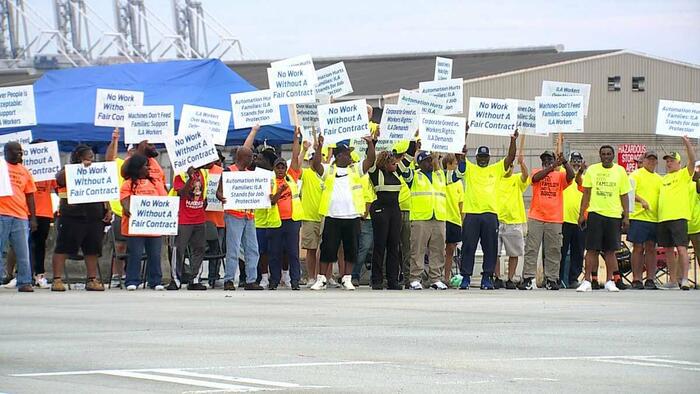Markets remain concerned by developments in the Middle East. This morning oil prices were subdued, but still heading for a weekly gain of about 8%. Meanwhile, markets are waiting for Israel’s pending retaliation against Iran and today’s US Employment Report.
Yesterday, the union of East Coast and Gulf Coast dockworkers reached an agreement with port operators, ending three day strike at ports from Maine to Texas. Port operators offered a 62% wage increase over six years, after the White House pressed the shipping lines and cargo terminal operators who employ the longshore workers to raise their earlier offer of 50%. The agreed wage increase is lower than the 77% demanded by the union (International Longshoremen’s Association, ILA), but it is a better deal than the union of the West Coast dockworkers reached last year. The base hourly rate for ILA port workers will be raised from $39 to $63 over six years. Note that many dockworkers currently earn more than $100,000 per year. The agreement lasts until January 15, 2025, while the two sides negotiate on other issues, such as automation on the docks. Obviously, the strike and wage increase have raised the incentives for cargo terminal operators to invest in automation: robots don’t strike! Or will they? Perhaps it depends on how much artificial intelligence you put in them.
While this deal averts shortages and price spikes in the short run, as many forward-looking importers brought in products earlier or diverted cargo to West Coast ports, it will lead to higher costs for shipping lines and cargo terminal operators, who are likely to pass some of it on to manufacturers, farmers and retailers. President Biden released a statement that “collective bargaining works, and it is critical to building a stronger economy from the middle out and the bottom up.” Note that Biden repeatedly made clear to the employers of the dockworkers that he would not use his federal powers to break the strike. We are likely to see a similar position taken by a Harris administration, so if she wins in November, other unions may feel encouraged to follow a similar path as the ILA.
While Biden seems to have been involved in the solution to the domestic port strikes, he seems to have been sidelined by Israeli PM Benjamin Netanyahu, who is betting that he can get away with anything now that the Democrats and Republicans are in the final weeks of a close race for the White House, the Senate and the House of Representatives. As the Israeli invasion of Lebanon continues, the Middle East is still waiting for Israel’s retaliation against Iran’s ballistic missile attack earlier this week. […]
— Read More: www.zerohedge.com
What Would You Do If Pharmacies Couldn’t Provide You With Crucial Medications or Antibiotics?
The medication supply chain from China and India is more fragile than ever since Covid. The US is not equipped to handle our pharmaceutical needs. We’ve already seen shortages with antibiotics and other medications in recent months and pharmaceutical challenges are becoming more frequent today.
Our partners at Jase Medical offer a simple solution for Americans to be prepared in case things go south. Their “Jase Case” gives Americans emergency antibiotics they can store away while their “Jase Daily” offers a wide array of prescription drugs to treat the ailments most common to Americans.
They do this through a process that embraces medical freedom. Their secure online form allows board-certified physicians to prescribe the needed drugs. They are then delivered directly to the customer from their pharmacy network. The physicians are available to answer treatment related questions.


